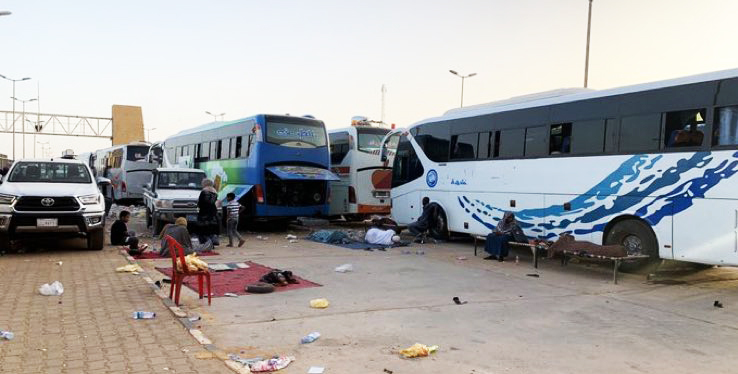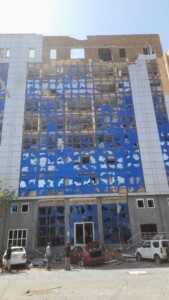Refugees from Sudan face dire conditions at Egypt’s Argeen crossing

Refugees from Sudan face long queues at Argeen border crossing into Egypt (Photo: @BSonblast / Twitter)
ARGEEN –
As the political and military situation in Sudan continues to deteriorate, thousands of refugees are attempting to flee to neighbouring countries. One of the primary routes is through the Argeen land crossing into Egypt. However, the process has proven to be extremely difficult, with reports of long waits and no access to basic amenities. Daily, more than 20 buses arrive at the crossing.
According to reports from people who have recently crossed, refugees must go through both the Sudanese and Egyptian border control checkpoints, a process that can take more than 24 hours. After leaving the Sudanese side, refugees traverse a long stretch of road known as the ‘neutral zone’, which can take another 24 hours.
Once refugees arrive at the Egyptian side of the border, they say they are met with chaos and confusion. Reports indicate that the processing of refugees is slow and disorganised, with little food or water available. Many women and children are left sitting on buses with no air conditioning or basic amenities.
The cost of a bus ticket to the border has increased dramatically in recent days, despite the commitment of some bus companies – in Northern state for example – to keep the old prices fixed.
Writing for Middle East Eye, Azza Guergues interviewed Noon Abdelbasit, a 21-year-old medical student from Khartoum, who arrived at the Argeen crossing on 22 April after a 850 kilometre, $200-journey.
She explained that although she was able to cross the border, her brother and two uncles were not allowed in. They had to travel to Wadi Halfa, close to the border, to apply for visas at the Egyptian consulate, which was closed at the time due to the Eid El Fitr holiday.
While Sudanese women and children do not require a visa to enter Egypt at land crossings, males aged between 16 and 50 need one.
Public support
In Egypt and other countries, many voiced their concerns via social media about the visa requirements for Sudanese males at the Argeen border crossing. The hashtags #Cancel_Visa_Requirements_For_Sudanese and #I_Support_Sudanese_In_Egypt were trending on social media to urge the Egyptian government to simplify the visa process or waive the requirement altogether, to make the crossing more accessible.
Despite the challenges, there are glimmers of hope for those fleeing the violence in Sudan. People in Aswan in Egypt, are opening their homes to refugees. As a show of solidarity, many landlords halved the rental for shops and other spaces least to Sudanese nationals.
Hotels in Aswan saw occupancy soar from 20 to 90 per cent in recent days. According to a report by Al Ahram, most of the guests at these hotels are Sudanese. Adelragab, a hotel manager in Aswan, noted that Sudanese guests are charged less than Egyptian guests “because we want to show our support for our Sudanese brothers and sisters”, he told the newspaper.
On the Sudanese side, members of the public are providing food and refreshments along the highway.











 and then
and then